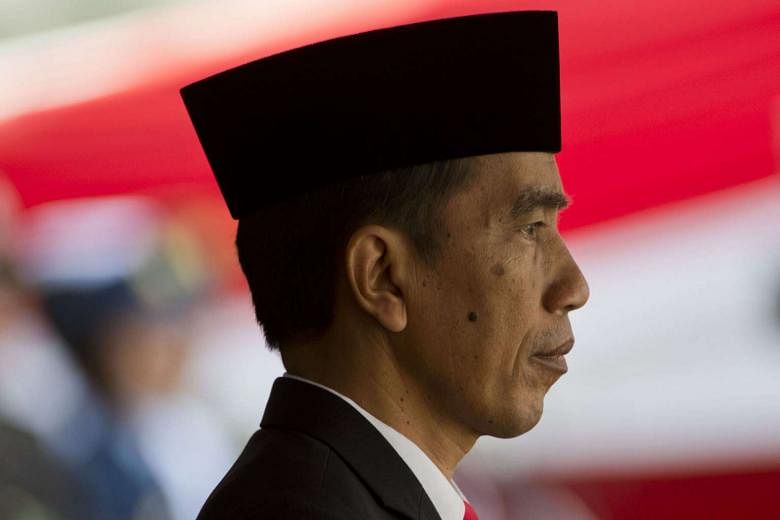(THE JAKARTA POST/ASIA NEWS NETWORK) - Indonesia has had its share of colourful leaders. There were those who transformed the country, and others whose rule was far too long.
Dictators that brought the country to decay. Presidents who frustratingly turned our hair grey.
None though were above the fray.
Neither is the present incumbent.
A man so far removed from traditional politics that one year on he remains as much a stranger as he is a game changer in the intersection of power, money, political party conventions and orthodoxy of Jakarta-based politics.
In his meteoric rise, President Joko "Jokowi" Widodo was flattered by the press like no other - referred to as "man of the people", "the phenomenon", "man of action, "carpenter to governor" and even "new hope" - and all contained a semblance of truth.
Yet it was his very strength as an outsider that equally served as his biggest weakness as president.
If the story of Soeharto's early years is of a man who quickly learned not to rely on those around him, then the story of Jokowi is of a man who doesn't know who to rely on.
The house of politics is built on the bricks of expectations, laid atop a foundation of reality that is dysfunctional to actuality.
As many around him are still driven by enthused expectation and the adrenaline of a divisive campaign in anticipating change, Jokowi knows he is engaged in a war of attrition beginning from his own internal ranks.
It has been a chastening year. A steep learning curve. A period to extricate political entanglements while accustoming to the art of statecraft and manoeuvering the lethargy of bureaucracy.
This week many will analyse his policies and decisions since his inauguration.
What is not plainly seen is whether, a year later, the toughest and loneliest job in Indonesia has changed the "decision of character" of a man who represented so much hope.
"A man's character is his fate," ancient Greeks said. And so rests the fate of this nation.
Most Indonesians are not privy to the inside workings of the palace complex in Central Jakarta. If they could peer inside, many would wonder why anyone would endure the kind of privations that power entails.
Beyond the public speeches and the impromptu "blusukan" visits, picture a man sitting alone at one end of a long banquet table adorning the all-white painted main hall of the century-and-a-half old Merdeka Palace.
Imagine palace staff in the late afternoon seeking the consideration of guests to wait for half-an-hour because the president - the country's most powerful man who could seek any menu on command - at 4 pm had not had time to have lunch!
Those two anecdotes encapsulates the man as a president.
A person who is alone, a man who is focused on work despite his shortcomings of the past year.
Jokowi may have learned much as president, but he has not unlearned the things that define his simple and candid character.
During a friendly chat one afternoon, the subject casually turned to how he maintained an unchanged appearance in the face of stress as others seemed to be balding or greying rapidly.
"I have one or two [grey hairs]," he remarked.
"I use kemiri [candle nut oil] frequently," he said casually before giving some serious advice: "But make sure to get it [the oil] at a [traditional] market so it's pure. Not the stuff they sell in stores!"
"And, of course, jamu [herbal medicine] every morning".
On Dec 28, as the nation was transfixed by the AirAsia flight QZ8501, which went down off the coast of Sumatra, killing the 162 people on board, the president was equally attentive to the fire that ravaged the well-known Klewer Market in Surakarta.
To his detractors, these simple remarks can be spun to show that a simpleton was elected president.
Yet amid the social media slander emerging at the time that the government was letting thousands of workers from China invade and take jobs away from Indonesians, these private instances dispel the online fabrication.
It shows how implausible it is that a man who talks avidly about kemiri, jamu and traditional markets would so casually let foreign workers invade this country.
Many may have the ambition and intellect for leadership, but few seem to have the apathy for its trappings.
Not one for the sake of appearances, even his aides sometimes lament that the president seems blasé about it, be it his suit that does not fall "right", or the "cheap" ties that are definitely not designer wear.
At one point his aides even slipped a more refined tie in his suit pocket in the hope that the president would use it alternatively. But no, it did not work.
During the days preceding his nomination as president, interest peaked about skinny, unremarkable-looking man who was attracting throngs like a rock star. We learned that there was more to Jokowi than met the eye.
As president, he has demonstrated that he is a complex figure with straightforward Javanese values that balance the modern and traditional.
If we were to find fault in his characteristic leadership during this first year, it would be the contradiction that as a man who honed his reputation through public engagement, he seems totally oblivious to the need to establish an effective communications strategy at the palace.
A failure to manage the narrative to counter the inevitable noise that accompanies a cacophonous political system.
All this only proves that no year is more difficult for any president than the freshman year.
Unfortunately, the only school for presidents is the presidency itself.

